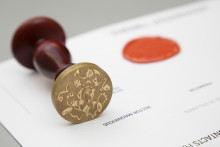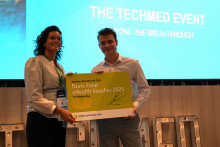Scientific personnel give the University of Twente a 7.1 as an employer, support staff a 7.0. Those grades are slightly higher than at other universities, according to a work pressure inquiry performed at the end of 2004. The survey also revealed several problems.
Over 1500 employees participated in the online survey of `work pressure and work pressure-related labor conditions' at the UT, held by Tilburg consultancy IVA at the end of last year. That survey showed that three-quarters of the UT personnel enjoys going to work.
However, on `work satisfaction,' the UT scores lower than the national average. Support staff, in particular, is slightly more negative on this issue. Only 52 percent of support staff agrees with the statement `If I could do it all over again, I would still choose to do this job.' 68 percent of scientific personnel agrees with that statement.
Work stress for UT personnel is `on average limited,' according to the report. Still, 17 percent of scientific personnel and 11 percent of support personnel `regularly or always' have problems with work. 31 percent of scientific personnel admit to worrying about work during leisure time.
Work changed `moderately to very strongly' over the past few years for 39 percent of support staff and 20 percent of scientific staff. The majority of them believe this to be the cause of the increase in the pressure they feel at work.
Working overtime is normal for 65 percent of the scientists and 40 percent of support staff. A full professor works an average 15 hours a week extra, an assistant or associate professor 7.5 hours and an ordinary support staffer works 3.4 hours overtime per week.
Professors, senior lecturers and teachers would like to spend more time on research and less time on organizational matters. Six out of ten employees in this category say they encounter problems as a consequence of the UT's financial distribution model. As for scientific personnel, 43 percent indicate they have too little time for education.
Most employees predict they will be working at the UT in three years (61 percent of scientific staff and 81 percent of support staff). Although 61 percent of scientific staff claim they would make more money outside the university, few see that as an important reason to consider leaving.
The quality of the work-supporting facilities is generally rated good or (as with the secretarial services) even very good. Least valued are the central and local services of the IT departments.
The complete report will soon be published on the UT website.
Trans. Jeroen Latour







